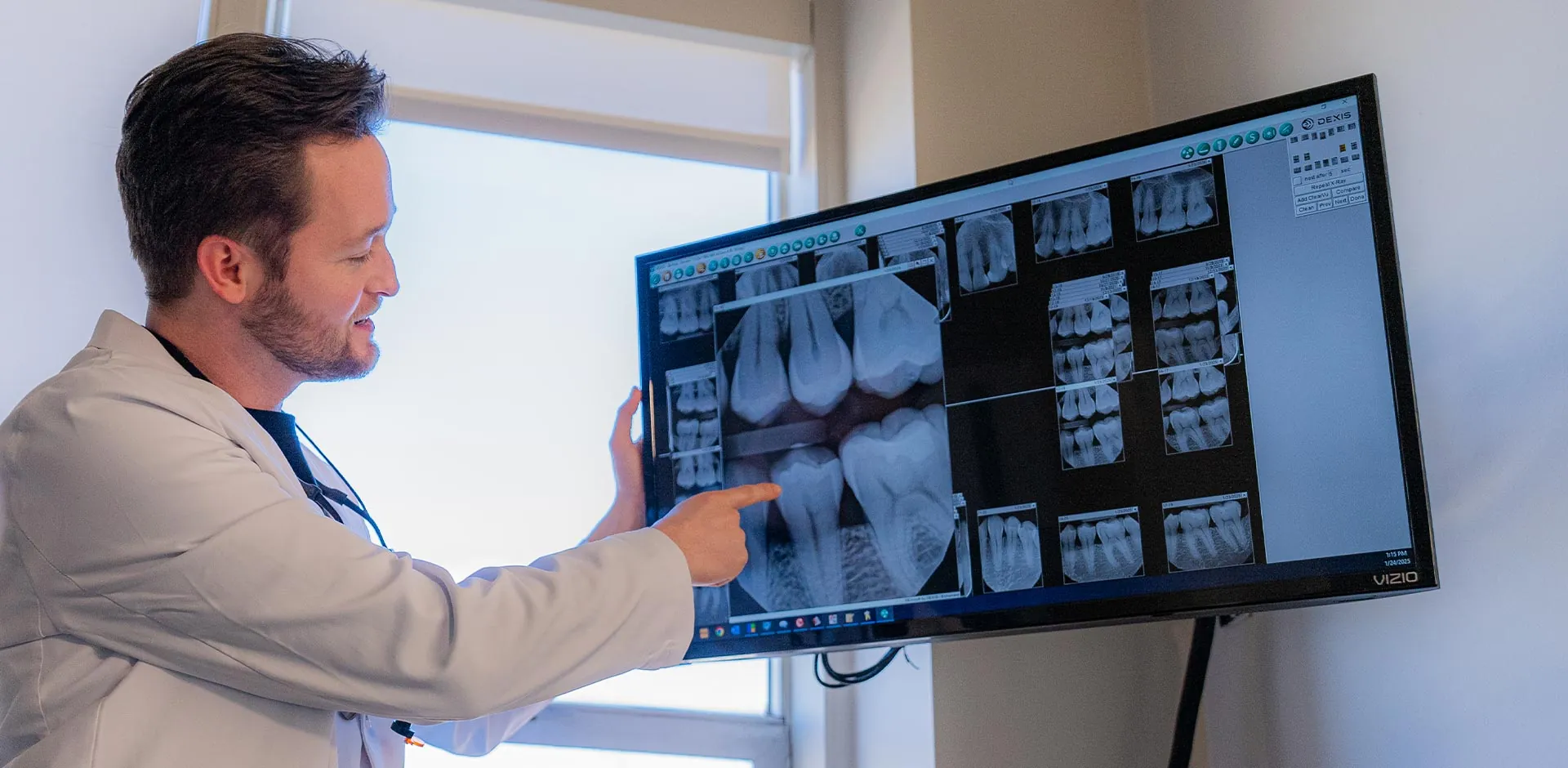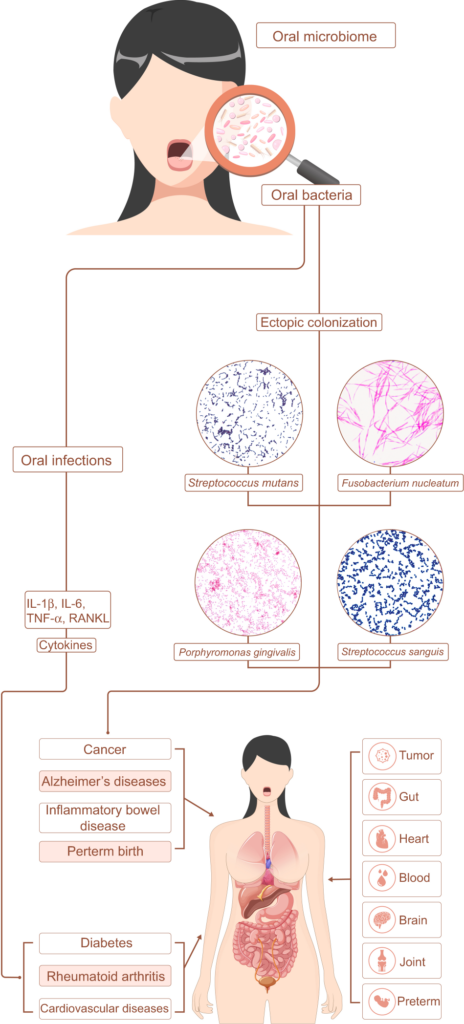
Urgent update from NATURE.COM. We have been talking for decades about the connection between oral health and overall health. A new research article published by Nature discusses oral bacteria (not normally found in the colon)....found in tumors of patients suffering from colon cancer. This is important. Let's talk about it.

What Is NATURE?
If you are unfamiliar, NATURE is a highly reputable peer reviewed journal. Scientists involved in research would kill to be featured in Nature. Studies published in Nature go through rigorous reviews and editing processes.
Here is a link to the article in question:
Click here to read the newly published study!
Okay, let's break it down. Starting with the title.
What Does The Title Mean?
"A distinct Fusobacterium nucleatum clade dominates the colorectal cancer niche."
Fusobacterium Nucleatum is a type of bacteria that we as dentists are VERY familiar with. This bacteria is commonly found in your mouth. Fusobacterium Nucleatum (Fn) is considered to be a periodontal disease pathogen, or in other words, one of the bacteria that causes/perpetuates periodontal disease.
Normally, this bacteria does not extend beyond the mouth - meaning we don't traditionally expect to see it in the GI tract.
So, the reason this title is so shocking is because these researchers found Fn dominating over 200 tumors they dissected from colorectal cancer patients!
Researches are a posing the question of "Why is this bacteria prominent in colon cancer?"...and so are we.
Why Does This Matter?
It is 2024. Cancer research is prominent and everyone is asking why the hell are we not able to find a "cure". Well, cancer is complicated - cancer cells change, adapt, and evade your immune cells, and therapies employed by doctors. The researchers from this article in question are expanding upon previous research that came to the conclusion of:
"...patients with CRC tumours harbouring high levels of Fn have poorer survival."
The statement above is saying that previous research has shown that patients suffering from colorectal cancer that have tumors with Fn have a lower likelihood of survival. This is really eye opening.
A BACTERIA COMMONLY FOUND IN PERIODONTAL DISEASE HAS BEEN SHOWN TO LOWER THE LIKELIHOOD OF SURVIVAL IF FOUND IN COLORECTAL TUMORS.
A Couple Of Points
- These researchers are saying that a select strain of Fn may possess carcinogenic capabilities.
- Basically not all Fn strains are predominating colon cancers
- Researchers have found that this specific strain of Fn is highly virulent and potentially increasing the spread and growth of this type of cancer.
- This is relevant because now researchers can try to create a drug that inhibits this Fn strain of bacteria and hopefully combat certain colon cancer tumor growths.
Okay, How Does This Relate To Teeth?
Fn bacteria are found in the oral cavity...we know that. But, researchers are curious how the bacteria is traveling to these colorectal tumors and why colon cancer patients have a lower survivability when Fn is present?
It has been previously proposed these bacteria enter the bloodstream due to daily oral hygiene practices and/or routine dental work performed at a dental office. Once in the bloodstream the bacteria are able to infiltrate the GI tract. But, how does a bacteria commonly found in the mouth survive the highly acidic environment of the gut?
Oral pH vs Gut pH
The mouth has a pH of about 6.7-7.3, which basically means the mouth is neither acidic nor basic - but tries to maintain neutrality. Bacteria, like animals, possess certain traits to survive in certain environments. For example, camels can survive in the extreme environment of the desert due to their large humps which store fat and valuable nutrients. Oral bacteria have certain traits for survival in neutral environments... and bacteria found in the stomach, have certain traits to survive extreme acidic environments. The stomach has a pH of about 1.5-3.5 ... so drastically different from the oral cavity.
So How Are These Oral Bacteria Surviving In The Gut?
Researchers have found that this certain subset of Fn possess traits to combat the acid attacks presented in the gastrointestinal tract. THIS IS WILD. These bacteria have adapted to survive beyond the mouth and are now not only being found in these tumors, BUT ARE MAKING THEM WORSE.
According to the article, these bacteria contain a glutamate-dependent acid resistance system called GDAR. They tested bacteria that had the GDAR system and those that didn't.
- Without GDAR: Fn survived for less than 10 minutes
- WITH GDAR: Fn survived for over 60 minutes
Oral bacteria that causes periodontal disease is decreasing the survival rate of colon cancer. Yikes. We hate that.
So What Now?
Your oral health is directly connected to your overall health. Colon cancer is on the rise. Previous research has shown connections between periodontal disease and heart health and oral bacteria and its perpetuation on various systemic diseases. But, now we are seeing a bacteria that seems to be decreasing the survivability of a specific type of cancer.
A couple of important takeaways:
- Your oral cavity is the gateway to your entire body - therefore it is very important to maintain a happy and healthy mouth.
- Oral bacteria affects your overall health and now we are seeing that it potentially can affect your body's ability to fight off cancer.
- Prioritize your oral health to optimize your body and hopefully reduce the probability of oral bacteria affecting your body systemically.
Conclusion
Research has shown that a certain subset of bacteria commonly found in the oral cavity is infiltrating colorectal cancers and making them worse. This presents the question of "does improving my oral health help my body when it comes to preventing and fighting off certain diseases?". I think it is fair to say a healthy mouth is one less thing for your body's immune system to worry about. Your immune system, like everything, has a max capacity. Periodontal disease wreaks havoc on your body and from this research... apparently it doesn't only affect your gums.
Read our other post about periodontitis and how it differs from gingivitis! Click here.
So, take charge of your oral health. If you have any questions please reach out!








